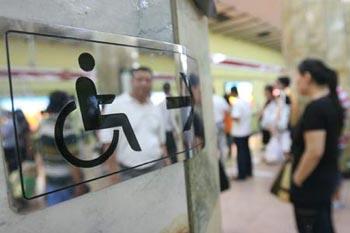World
Paralympics: barrier-free in Beijing
Source: Xinhua | 09-05-2008 11:03
Special Report: Beijing 2008 Paralympic GamesBEIJING, Sept. 5 (Xinhua) -- Beijing declared absolutely ready for the Paralympics on Friday, pledging barrier-free facilities and services of transportation for the disabled during and after the Games.
 |
| Photo taken on Aug. 27, 2008 shows the barrier-free sign at a subway station in Beijing, capital of China. Numbers of barrier-free signs have appeared recently at Beijing subway stations as the Beijing Paralympic Games approaches. (Xinhua Photo) |
"We are working to offer personalized services for the disabled people in terms of reservations for taxis and public vehicles, construction of ramps and barrier-free toilets and others," said Liu Zhi, spokesman for the Beijing Paralympic Games.
"All the facilities designed for the disabled will continue to use even after the Games," he added.
The organizing committee has provided wheelchair users with 70 barrier-free taxis during the Paralympics, accepting phone appointments by dialing 961001, according to Liu.
"Besides, we have strengthened training for service staff who provide reservation and relay service to realize entirely barrier-free trip for disabled passengers," he said.
They could reach 96166 and 96834568, respectively, to request help for taking public vehicles and subways.
To ensure barrier-free trip for the disabled people in subways, Beijing has paved blind tracks and installed with Braille marks in gateways. Meanwhile, over 300 elevators, lifting platforms and stair-climbing vehicles were installed to carry wheelchairs.
The city has 2,835 low-floor barrier-free buses and 600 barrier-free buses for the disabled people, with blind paths, ramp roads, wheelchair waiting areas and ground marks set to help them, according to Liu.
To help the blind pedestrians and wheelchair users, Beijing has paved 1,541-kilometer-long paths for the visually impaired in 880 urban roads, and built 23,641 ramp crossings in such key areas as busy streets and peripheries of the Paralympic venues.
Meanwhile, a total of 18 underground passages and 48 overpasses accessible for wheelchairs, while some 450 overpasses and underground passages built with special care for the visually impaired, Liu said.
The world's premier event for disabled athletes is to begin Saturday in Beijing, where more than 4,000 competitors from 148 countries and regions were readying for participation in a total of472 disciplines in 20 sports.



